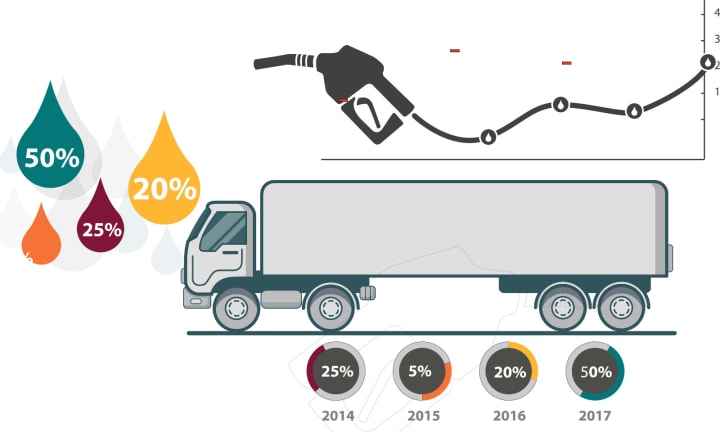How Our Fuel Managemnt System Helps Logistics Owners.
Logistic Industry

Our fuel management system offers several ways to assist logistics owners:
Cost Savings: By optimizing fuel consumption, reducing theft, and minimizing inefficient routes, our system helps lower overall fuel expenses, leading to significant cost savings for logistics owners.
Enhanced Efficiency: The system automates fuel-related processes such as procurement, delivery planning, and monitoring. This streamlines operations, reduces manual efforts, and minimizes potential errors, allowing logistics owners to focus on core tasks like transportation and supply chain management.
Real-time Monitoring: Our system provides real-time visibility into fuel levels, consumption, and deliveries. Logistics owners can monitor fuel usage patterns, detect anomalies, and proactively address issues. This helps prevent fuel shortages, delays, and disruptions in the supply chain.
Inventory Management: Accurate tracking and management of fuel inventory are facilitated by our software. Logistics owners can maintain optimal fuel levels, ensuring sufficient supply to meet operational demands while avoiding excessive storage costs. The system generates alerts for low inventory, enabling timely replenishment.
Route Optimization: By integrating with GPS and vehicle tracking systems, our fuel management system optimizes routes based on fuel efficiency. It considers factors such as traffic conditions, fuel consumption rates, and vehicle load to suggest the most economical routes. This reduces fuel consumption, travel time, and associated costs.
Analytics and Reporting: Comprehensive analytics and reporting features provide insights into fuel consumption trends, costs, and efficiency metrics. Logistics owners can identify areas for improvement, track performance, and make data-driven decisions to optimize fuel usage.
Regulatory Compliance: Our system assists logistics owners in complying with regulatory requirements related to fuel usage and reporting. It generates accurate reports and documentation necessary for compliance with environmental standards and government regulations.
Security and Accountability: The software enhances security and accountability in fuel management. It tracks fuel transactions, monitors fuel usage by vehicles and equipment, and helps identify instances of theft or unauthorized fuel consumption. This promotes transparency and reduces the risk of fuel-related fraud.
Integration with Logistics Systems: Our fuel management system seamlessly integrates with existing logistics management software, creating a smooth workflow. This integration ensures efficient information flow between different systems, reducing data duplication and manual data entry.
Sustainability and Environmental Impact: By optimizing fuel consumption and reducing wastage, our system contributes to environmental sustainability. It helps logistics owners reduce their carbon footprint, minimize emissions, and align with sustainability goals.
Our fuel management system assists logistics owners by providing cost savings, enhancing efficiency, enabling real-time monitoring, optimizing inventory and routes, offering analytics and reporting, ensuring regulatory compliance, improving security, integrating with logistics systems, and promoting sustainability. It streamlines fuel management processes, drives operational improvements, and helps achieve business goals.
Fuel Management System For Trucks

A fuel management system for trucks is a comprehensive solution designed to monitor and optimize fuel usage in truck fleets. It incorporates various technologies and features to track fuel consumption, improve efficiency, reduce costs, and enhance overall fleet management. Here are some key components and functionalities typically found in a fuel management system for trucks:
Fuel Monitoring: The system includes sensors and monitoring devices that gather real-time data on fuel levels, consumption rates, and refueling activities. This information is often transmitted wirelessly to a centralized platform for analysis.
GPS Tracking: Integrated GPS technology enables fleet managers to track the location and movement of trucks, allowing for better route planning, optimized dispatching, and improved fuel efficiency.
Data Analysis and Reporting: The system collects and analyzes fuel-related data, generating comprehensive reports on fuel consumption patterns, efficiency metrics, driver behavior, and potential areas for improvement. These reports help fleet managers make informed decisions to optimize fuel usage and reduce costs.
Fuel Theft Prevention: Fuel management systems often include anti-theft measures such as fuel cap sensors, tamper alarms, and geofencing capabilities. These features help detect and prevent unauthorized fuel access or theft.
Driver Behavior Monitoring: Some systems incorporate driver performance monitoring, tracking behaviors such as harsh acceleration, braking, and excessive idling. By identifying inefficient driving habits, fleet managers can provide training and incentives to encourage more fuel-efficient practices.
Integration with Fleet Management Software: Fuel management systems can integrate with broader fleet management software, allowing for streamlined data sharing and comprehensive fleet oversight. This integration enhances operational efficiency and simplifies administrative tasks.
Fuel Card Integration: Many systems integrate with fuel cards or other payment methods, enabling automatic fuel transaction data capture. This integration simplifies the fueling process, reduces administrative workload, and improves accuracy in tracking fuel expenses.
Fuel Efficiency Optimization: The system may offer features such as route optimization, vehicle maintenance reminders, and fuel-saving suggestions to maximize fuel efficiency and reduce operational costs.
Environmental Monitoring: Some advanced fuel management systems incorporate environmental sensors to monitor emissions, providing insights into the ecological impact of the fleet's operations.
Regulatory Compliance: The system may include features to ensure compliance with environmental regulations, such as emissions standards and reporting requirements.
Implementing a fuel management system for trucks can provide significant benefits to fleet operators, including cost savings, improved operational efficiency, reduced fuel consumption, enhanced driver safety, and increased environmental sustainability.
About the Creator
Vamosysgps
Fuel level sensors are devices used to measure and monitor the quantity of fuel in a tank or reservoir. They are commonly used in various industries, including automotive, marine, aviation, and industrial applications.






Comments
There are no comments for this story
Be the first to respond and start the conversation.